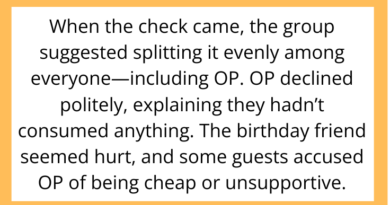AITAH for Refusing to Pay for My Sister’s Wedding After She Mocked My Career?
When family and money collide, it can create explosive situations that test even the strongest relationships. In today’s AITAH story, we explore a scenario that left thousands of Reddit users debating who was truly in the wrong.
Let’s unpack what happened.
The Background: A Self-Made Success

The original poster—let’s call him Ryan—shared that he grew up in a working-class family where money was always tight. Determined to break the cycle, Ryan started his own small business straight out of high school. Over the years, he built it into a thriving company and now enjoys a comfortable income.
His younger sister, Amy, was always more academically inclined and ended up getting a Master’s degree in Art History. While Ryan respected her path, he often felt that she looked down on him for “not being educated” and “just running a business.”
Still, when Amy got engaged, Ryan was excited to help her celebrate. He had planned to contribute $20,000 toward her wedding as a gift.
Everything changed after one fateful family dinner.
The Insult That Changed Everything

At a family gathering to discuss wedding plans, Amy started mocking Ryan’s business in front of everyone. She joked that he “got lucky selling cheap junk online” and implied he wouldn’t understand the finer details of planning an “elegant” wedding.
Ryan was embarrassed and hurt, especially since Amy had never achieved financial independence herself. She was still partially supported by their parents.
After stewing on it for a few days, Ryan called Amy to tell her he was rescinding his offer to pay for the wedding. He explained that he wouldn’t spend money to support someone who openly disrespected him.
Amy was furious. She accused Ryan of overreacting, called him petty, and said he was ruining the happiest day of her life out of spite.
Where’s the Line? Respect and Generosity

This story hit a nerve because it taps into a question many people grapple with: Do we owe our family financial support, even if they treat us poorly?
Ryan’s Perspective
Ryan felt he was extending a gesture of generosity that Amy never appreciated. Being publicly belittled was the final straw. From his point of view, respect is a two-way street, and no one—family or not—deserves free money from someone they degrade.
Amy’s Perspective
Amy saw Ryan’s withdrawal of funds as disproportionate and vengeful. To her, family contributions are about unconditional support, not transactional approval. She felt Ryan weaponized his success to punish her.
Reddit’s Verdict

The AITAH community overwhelmingly sided with Ryan.
Top comments included:
-
“She mocked you in front of everyone. Actions have consequences.”
-
“It’s your money. If she can’t respect you, she shouldn’t expect your help.”
-
“Family doesn’t entitle you to someone’s wallet.”
However, a smaller group sympathized with Amy, arguing that Ryan should have addressed the insult privately rather than pulling financial support so close to the wedding.
Family Money Dynamics: Common Pitfalls

This story isn’t just about a single insult. It highlights deeper issues many families face:
-
Resentment over unequal success: Amy may have been projecting insecurities about her own financial situation.
-
Assumption of entitlement: Sometimes, when someone is generous, others come to expect that help without gratitude.
-
The challenge of setting boundaries: It’s difficult to draw a line without seeming vindictive, even when you have every right to protect your dignity.
Should Generosity Require Respect?

This scenario begs an important question: Should gifts come with expectations? While many people would say no, it’s human nature to want appreciation—and at least basic respect—in return.
Ryan’s decision wasn’t about punishing Amy’s wedding. It was about defending his self-worth. And while some might see it as petty, others would argue it was long overdue.
What Can We Learn?

If you find yourself in a similar situation, here are a few takeaways:
-
Communicate early: If someone’s behavior upsets you, don’t let resentment build.
-
Set clear boundaries: Financial help should be a choice, not an obligation.
-
Decide what you can give without expecting anything in return: If you can’t, it’s okay to step back.



